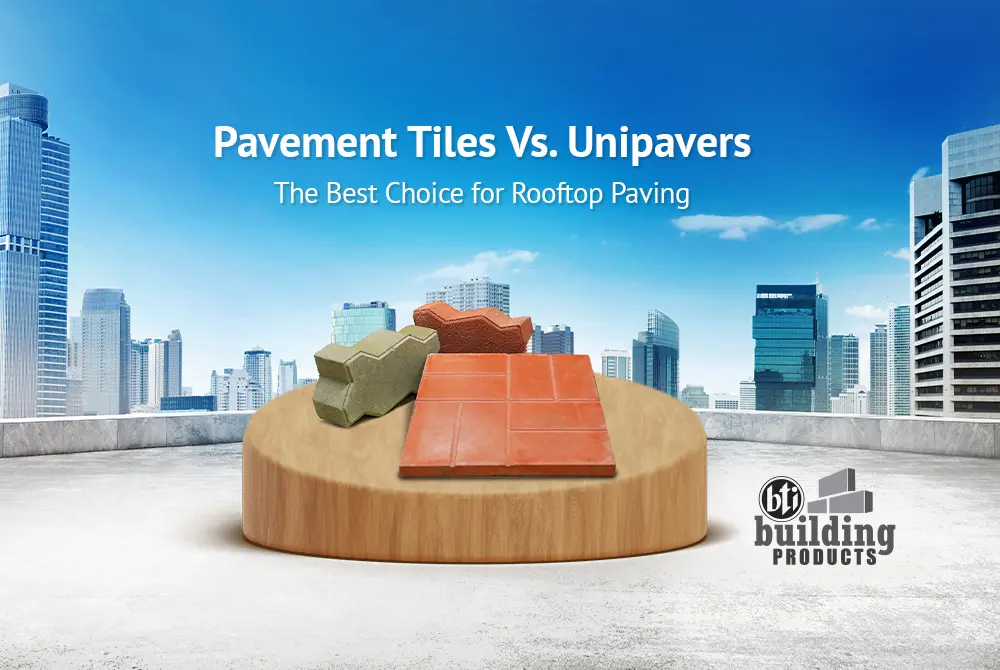
Pavement Tiles Vs. Unipavers: The Best Choice for Rooftop Paving
When it comes to rooftop paving, choosing the right material is crucial. Not only does it affect the aesthetic appeal of the space, but it also impacts durability, maintenance requirements, and environmental factors.
Among the various options available, pavement tiles and unipavers stand out as popular choices. In this blog, we’ll delve into the characteristics of both to determine the best option for rooftop paving.
Pavement Tiles:
Pavement tiles are commonly made of materials like concrete, clay, or natural stone. They come in a variety of shapes, sizes, colors, and textures, offering versatility in design. Here are some key points to consider when evaluating pavement tiles for rooftop paving:
-
Aesthetic Appeal
- Pavement tiles offer a wide range of design possibilities, allowing for creative arrangements and patterns. They can complement the overall aesthetic of the building and surrounding landscape.
-
Durability
- Concrete and natural stone tiles are known for their durability, ability to withstand heavy foot traffic and adverse weather conditions. Properly installed and maintained, pavement tiles can last for decades.
-
Installation
- Pavement tiles are relatively easy to install, especially when using interlocking varieties. However, professional installation is recommended to ensure proper alignment and stability.
-
Maintenance
- While pavement tiles are durable, they may require occasional cleaning to maintain their appearance. Regular sweeping and occasional pressure washing can help prevent dirt and debris buildup.
-
Cost
- The cost of pavement tiles varies depending on the material, size, and design. While initial costs may be higher than some alternatives, the long-term durability and aesthetic appeal can justify the investment.
Unipavers
Unipavers, also known as concrete pavers, are precast concrete blocks designed specifically for paving purposes. They are available in various shapes, sizes, and colors, offering flexibility in design. Here’s a closer look at the characteristics of unipavers:
Strength and Durability
Unipavers are highly durable, capable of withstanding heavy loads and constant foot traffic. They are engineered to resist cracking and shifting, ensuring long-term stability.
Installation
Unipavers are typically installed on a compacted base of gravel or sand, making them relatively easy to install. The interlocking design helps create a seamless surface that can accommodate slight movements without causing damage.
Versatility
Unipavers come in a range of shapes and sizes, allowing for creative designs and patterns. They can be used to create intricate pathways, courtyards, or outdoor living spaces on rooftops.
Maintenance
Like pavement tiles, unipavers require minimal maintenance. Occasional sweeping and rinsing with water are usually sufficient to keep them clean. In case of stains or algae growth, pressure washing may be necessary.
Cost
Unipavers are generally cost-effective compared to natural stone or clay tiles. Their affordability, combined with their durability and versatility, makes them a popular choice for rooftop paving projects.
Choosing the Best Option
Both pavement tiles and unipavers offer distinct advantages for rooftop paving projects. The choice between the two ultimately depends on factors such as aesthetic preferences, budget constraints, and the specific requirements of the project. Here are some considerations to help make an informed decision:
-
Aesthetic Preferences
If you’re looking for a wide range of design options and natural textures, pavement tiles may be the preferred choice. However, if you prefer a more uniform and contemporary look, unipavers might be a better fit.
-
Budget
Consider your budget for the project, including material costs, installation expenses, and long-term maintenance. Unipavers generally offer a more cost-effective solution without compromising on durability or aesthetic appeal.
-
Maintenance Requirements
Assess the level of maintenance you’re willing to commit to. Both pavement tiles and unipavers are low-maintenance options, but pavement tiles may require slightly more upkeep to preserve their appearance.
-
Climate and Environmental Factors
Take into account the climate and environmental conditions of the rooftop location. Both pavement tiles and unipavers are resilient to weather extremes, but certain materials may perform better in specific climates.
In conclusion, both pavement tiles and unipavers are excellent choices for rooftop paving, offering durability, aesthetic appeal, and versatility. By carefully evaluating your priorities and project requirements, you can determine which option best suits your needs.
Whether you opt for the timeless elegance of pavement tiles or the practicality of unipavers, investing in quality materials and professional installation will ensure a beautiful and functional rooftop space for years to come.




